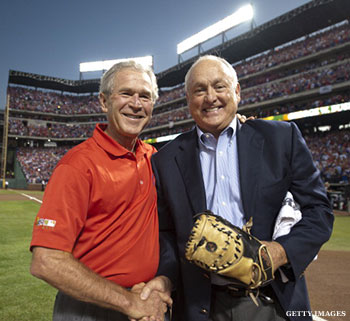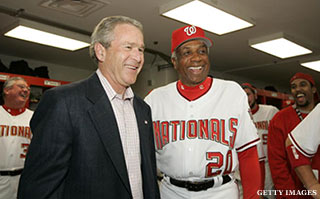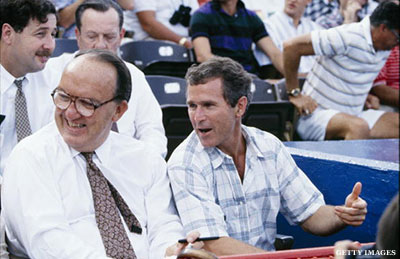
A juicy rumor has circulated for years: George W. Bush entered the political arena only because he could not land the job he really coveted -- Major League Baseball commissioner.
Whether the president-as-a fallback story is veritable fact or partisan fiction -- and a source close to Bush said he would have enthusiastically accepted the commissioner's post at one time -- the reality is that current MLB commissioner Bud Selig, presiding over his penultimate World Series, has set his retirement date for Jan. 24, 2015.
Regardless of your positioning on the right or left side of the aisle, there is no denying the former Texas Rangers owner's qualifications for that job.
Squabbles over steroids, luxury tax and instant replay would pale in comparison with 9/11, two wars and a subprime mortgage crisis.
"Anything conceivable that he would have to confront after that," said Tom Grieve, the Rangers general manager from 1984 to 1994, "would pretty much be a piece of cake."
The transition from running the free world to running a sport may sound odd --perhaps unbecoming of a former world leader -- but Condoleezza Rice just made the jump from international diplomat to the gridiron, going from secretary of state to College Football Playoff Selection Committee member.
And aptly called the "National Pastime," baseball has been part of the fabric of American history.
George Washington and his revolutionary soldiers played "rounders" at Valley Forge. John Adams played "bat and ball"; Andrew Jackson's version was "one old cat." William Howard Taft began the tradition of presidents throwing out the first pitch when he threw a ball from his seat to Washington Senators pitcher Walter Johnson on April 15, 1910. Ronald Reagan announced Chicago Cubs games on the radio.

Bush's connection to baseball, though, transcends that of all other presidents.
When traveling abroad to visit foreign dignitaries (in the days before smartphones), Bush had box scores sent to him. While exercising on the treadmill, the television was turned to baseball. He used to quiz Grieve on starting lineups from the 1940s and '50s.
"His knowledge of baseball and the players runs so deep," said Ari Fleischer, Bush's press secretary from 2001 to 2003. "He could tell you who the backup shortstop is for Toronto."
In addition to his knowledge of the game, Bush has the requisite baseball experience. As an owner of the Rangers from 1989 to 1998, he turned around the fate of the franchise, showing why he has the chops to succeed Selig.
"He'd be a great commissioner," Grieve said. "Does he have the qualifications and could he do it? Of course."
During their entire existence, the Rangers finished above .500 just five times before Bush's arrival. They would match that total by Year Seven of Bush's tenure.
Bolstered by the free-agent signing of pitcher Nolan Ryan, the Rangers not only posted their first winning record (83-79) in three years, but they also surpassed two million in attendance for the first time in team history during Year One of Bush's ownership.
"It was a revitalization of the franchise," said John Blake, the Rangers vice president of public relations during Bush's tenure.
Bush's role in energizing the Rangers came about after helping with his father's presidential campaign in 1988. When Bush heard that Fort Worth oilman and Rangers owner Eddie Chiles was putting the team up for sale, he gathered an investment group that would eventually include Tom Schieffer and Edward "Rusty" Rose.

Though his initial stake was around $600,000 -- he would later augment that investment -- Bush was the face of the Rangers. He was instrumental in marketing Ryan aggressively and expanding the team's appeal through Spanish broadcasts. Unlike most owners Bush did not sit in a luxury box. Near the dugout he would cheer, interact with fans and sign autographs.
"He was selling Rangers baseball from the moment he took ownership," Blake said.
As the team's managing general partner, Bush, who was no George Steinbrenner, had to approve all transactions. Though he wanted to know the intimate dealings of everything Rangers, he never told the personnel staff how to do their job, who to sign, who to trade or who to release.
"He was a perfect person to work under," Grieve said.
At the first meeting, the new owners -- Bush (the front man) and Rose (the financial chairman of the board) — realized they needed an upgrade from Arlington Stadium, a converted minor league park, to bring in revenue and compete with the rest of the major league teams.
Though similar measures were being killed by voters elsewhere, Bush helped push through a referendum by a 2:1 margin to approve public funds for a new $191 million ballpark.

On April 1, 1994, Rangers Ballpark in Arlington opened. The state of the art, baseball-only facility was completed in just 23 months. Lauded for its aesthetics, the 48,114-seat park led to Texas hosting the 1995 All-Star Game, further cementing the baseball presence of the Rangers in the football-mad state.
After being elected governor in 1994, Bush resigned from his managing partner position but retained his partial ownership of the Rangers. His rise in the political world occurred shortly after baseball had reached its nadir.
The strike began on August 11, 1994. The owners had ousted Fay Vincent as commissioner two years earlier. Bush was among the owners who was in favor of keeping Vincent. Selig took over as acting commissioner until assuming the reins on a permanent basis in 1998, a month after Bush, whose ownership stake had increased to 11.3 percent, sold the Rangers to Tom Hicks while profiting handsomely with a $14.9 million payout.
In 2000 Bush would become the nation's 43rd president.
A devoted baseball fan himself, Fleischer deemed the commissioner of baseball as the second best job in America, labeling the emeritus role of former president as the "best."
"The life of a former president is a wonderful life," Fleischer said. "I don't think we'll ever see a day where a former president re-enters or enters the private sector for a regular full-time job."
Bush, who declined interview requests for this story, enjoys working at his presidential library and dedicates himself to several causes, including Wounded Warrior Project, breast and cervical cancer treatments in Africa and education reform in the United States. He regularly golfs, bikes and -- yes -- paints.
"He would be a great commissioner," said Fleischer, who now runs Ari Fleischer Sports Communications, a company whose clients have included MLB and various commissioners. "But it's not going to happen."
Even if it's not in an official capacity, Bush, 67, remains a passionate fan of the game and the Rangers. He attends eight to 10 Rangers games a year. After the Rangers swept New York a couple of years ago, Bush sent a three-word email to Fleischer, a lifelong Yankees fan, which read: "Who's your daddy?"
For the patriarchal position of baseball commissioner, several names have surfaced as candidates, and each would have to secure the approval of 24 of the 30 owners. MLB chief operating officer Rob Manfred helped usher in labor deals and a strict drug testing policy, and MLB executive vice president, business Tim Brosnan pushed baseball's television growth and solidified its sponsorship deals.
Three team executives -- Tigers president and general manager David Dombrowski, Brewers owner Mark Attanasio and Braves CEO Terry McGuirk -- have been mentioned.
Joe Torre, who won four World Series as Yankees manager, and Mets general manager Sandy Alderson, who previously served as A's GM during the Bash Brothers era and then as MLB's executive vice president of baseball operations, also are eminently qualified to become the National Pastime's 10th commissioner.
Then there's Bush, the most intriguing one of them all.
"His name has come up before," Blake said. "Would he be good for the game? Yeah."
-- Follow Jeff Fedotin on Twitter @JFedotin.




